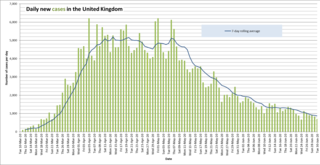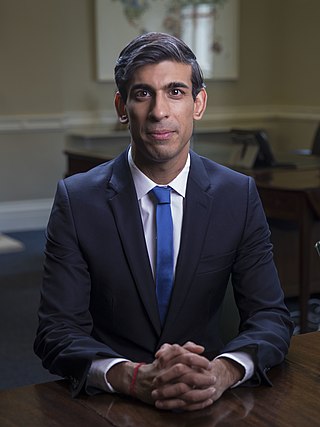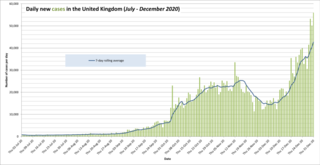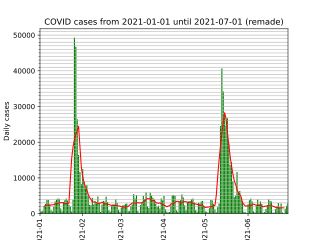A spending review, or occasionally a comprehensive spending review, is a governmental process in the United Kingdom carried out by HM Treasury to set firm expenditure limits and, through public service agreements, define the key improvements that the public can expect from these resources.

Rishi Sunak is a British politician who has served as Prime Minister of the United Kingdom and Leader of the Conservative Party since 2022. The first British Asian prime minister, he previously held two cabinet positions under Boris Johnson, latterly as Chancellor of the Exchequer from 2020 to 2022. Sunak has been Member of Parliament (MP) for Richmond (Yorks) since 2015.
2020s political history refers to significant political and societal historical events in the United Kingdom in the 2020s, presented as a historical overview in narrative format.

The COVID-19 pandemic in Saudi Arabia is part of the worldwide pandemic of coronavirus disease 2019 caused by severe acute respiratory syndrome coronavirus 2. The first case in the kingdom was confirmed by the Ministry of Health on 2 March 2020 and in the following months, the kingdom held the highest number of confirmed cases in the Arab states of the Persian Gulf.

The March 2021 United Kingdom budget, officially known as Protecting the Jobs and Livelihoods of the British People was a budget delivered by Rishi Sunak, the Chancellor of the Exchequer in March 2021. It was expected to be delivered in autumn 2020, but was postponed because of the COVID-19 pandemic. It succeeds the budget held in March 2020, and the summer statement and Winter Economy Plan held in summer and autumn 2020, respectively. The budget is the second under Boris Johnson's government, also the second to be delivered by Sunak and the second since Britain's withdrawal from the European Union. The budget was the first for government expenditure in the United Kingdom to exceed £1 trillion.

In response to the COVID-19 pandemic in the United Kingdom, the UK Government introduced various public health and economic measures to mitigate its impact. Devolution meant that the four nations' administrative responses to the pandemic differed; the Scottish Government, the Welsh Government, and the Northern Ireland Executive produced different policies to those that apply in England. Numerous laws were enacted or introduced throughout the crisis.

The following is a timeline of the COVID-19 pandemic in the United Kingdom from January 2020 to June 2020.

The Coronavirus Job Retention Scheme (CJRS) was a furlough scheme announced by Rishi Sunak, the Chancellor of the Exchequer, on 20 March 2020, during the COVID-19 pandemic in the United Kingdom. The scheme was announced as providing grants to employers to pay 80% of a staff wage and employment costs each month, up to a total of £2,500 per person per month. The scheme initially ran for three months and was backdated to 1 March.

The July 2020 United Kingdom summer statement was a statement from the British Government, or mini-budget statement, delivered on 8 July 2020 by Rishi Sunak, the Chancellor of the Exchequer. It followed the budget delivered earlier in the year, and preceded the Winter Economy Plan. The purpose of the statement was to announce measures aimed at helping to promote economic recovery following the impact of the COVID-19 pandemic. The statement was delivered to the House of Commons, where Sunak unveiled a spending package worth £30bn. Concerns were subsequently raised by organisations including HM Revenue and Customs and the Institute for Fiscal Studies about the statement's impact, as well as its cost-effectiveness, while at least one major retailer declined to take advantage of a financial bonus scheme intended for rehiring employees placed on furlough during the pandemic.

The Winter Economy Plan was a statement from the British Government, or mini-budget statement, delivered on 24 September 2020 by Rishi Sunak, the Chancellor of the Exchequer. It succeeded the summer statement held earlier in the year, and was a partial replacement to the cancelled budget scheduled for the Autumn. The purpose of the statement was to announce measures aimed at further helping to promote economic recovery following the impact of the COVID-19 pandemic. The statement was delivered to the House of Commons. The plan aimed to further promote economic recovery while preserving jobs and businesses which were considered viable.

The following is a timeline of the COVID-19 pandemic in the United Kingdom from July 2020 to December 2020.

The following is a timeline of the COVID-19 pandemic in the United Kingdom from January 2021 to June 2021.

The following is a timeline of the COVID-19 pandemic in the United Kingdom from July 2021 to December 2021.
Events from the year 2022 in the United Kingdom.

Rishi Sunak served as Chancellor of the Exchequer of the United Kingdom from his appointment on 13 February 2020 to his resignation on 5 July 2022. His tenure was dominated by the COVID-19 pandemic in the United Kingdom, with Sunak becoming a prominent figure in the government's response to the pandemic, giving economic support to struggling businesses through various schemes. He was also involved in the government's response to the cost of living crisis, UK energy supply crisis, and global energy crisis.

The October 2021 United Kingdom budget, officially known as the Autumn Budget and Spending Review 2021. A Stronger Economy for the British People, was a budget statement made by Chancellor of the Exchequer Rishi Sunak on 27 October 2021. It was the third and final consecutive budget delivered by Sunak before his resignation in July 2022.

The following is a timeline of the COVID-19 pandemic in the United Kingdom from July 2022 to December 2022.

The November 2022 United Kingdom autumn statement was delivered to the House of Commons on 17 November 2022 by Chancellor of the Exchequer Jeremy Hunt, after being delayed by three weeks from its original scheduled date of 31 October. The budget addressed the ongoing cost of living crisis, and saw the announcement of a five-year package of tax increases and spending cuts designed to steer the UK through recession. An economic forecast published on the same day by the Office for Budget Responsibility (OBR) stated the UK had entered a recession after experiencing two quarters of a shrinking economy, and predicted the UK's economy would shrink during 2023. A reduction in households' disposable income was also forecast.

The November 2023 United Kingdom autumn statement was outlined to the House of Commons on 22 November 2023 by Chancellor of the Exchequer Jeremy Hunt. The statement, Hunt's second as Chancellor, came at a time when the governing Conservative Party was trailing in the opinion polls, with the Labour Party experiencing a double-digit lead, and was expected to be his last autumn statement before the next general election.













